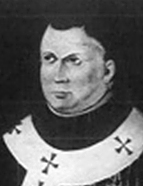

One of the most prolific writers on historical-philological themes and a leading political pamphleteer of his time in counter-revolutionary thought, as well as a correspondent and honorary member of the Academia das Ciências de Lisboa [Lisbon Academy of Sciences], a general studies reformer, and Archbishop of Évora under King Miguel, whom he loyally served even in exile, Friar Fortunato de São Boaventura — whose secular name remains unknown — stands as a significant example of a multifaceted author and a politically consistent figure in both ideas and actions. He comes from an "honourable" family background from Alcobaça, in the words of Inocêncio Francisco da Silva, his father was a bookseller, according to the same source. At eighteen, he professed the Cistercian rule of St Bernard in the affluent monastery of Alcobaça, during an era of the Ancien Régime when joining the regular clergy often served as a gateway to an intense cultural life and a well-ordered, informed worldview — as exemplified by José Liberato Freire de Carvalho (born in 1772) at the monastery of São Vicente de Fora in Lisbon. He completed his preparatory studies in Coimbra, obtained a bachelor's degree in 1806, followed by a licentiate and doctorate in 1810 from the Faculty of Theology (already reformed, it should be noted), and went on to teach at the College of Arts and later at the University, eventually becoming a Professor of Theology. In 1808 and 1809, the years of the French invasions, his first known writings surfaced, six pamphlets printed on the University's royal printing press, marking the legitimisation of their content. These works include one written in Latin and addressed to the vice-rector, two translations concerning Napoleon's expansionist policy and the siege of Zaragoza, eulogies of Francisco da Silveira Pinto da Fonseca, and tributes to the actions of the academic volunteer corps in the armed struggle against Napoleonic forces, which he joined as early as 1807, according to memoirist Marquis of Fronteira, as quoted by João Ameal (although another source cites 1808). In 1812 he took on the role of substitute lecturer in theology and in 1817 he became a professor of Greek at the College of Arts.
This work is financed by national funds through FCT - Foundation for Science and Technology, I.P, in the scope of the projects UIDB/04311/2020 and UIDP/04311/2020.
